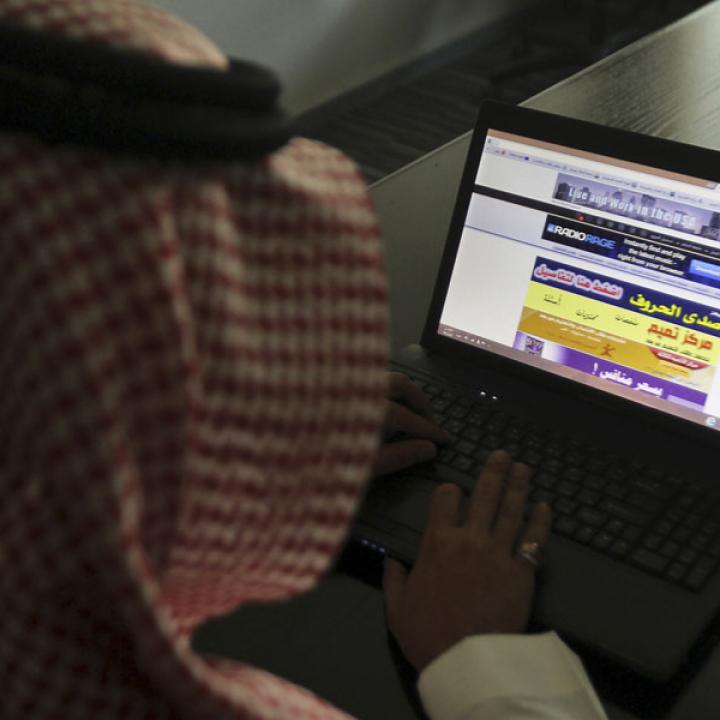
- Policy Analysis
- Articles & Op-Eds
New Saudi Poll Shows Iran, Russia, United States, and ISIS Are All Unpopular; Mixed Views on Others

Recent survey results reveal the nuances in Saudi public opinion on a wide variety of pressing regional issues, and the role of foreign powers in resolving them.
A rare national survey from Saudi Arabia, completed in September, reveals that the public holds a very low opinion of various rival regional and outside powers. By contrast, both Egypt and its adversary Hamas enjoy moderately positive ratings, and even the Muslim Brotherhood received favorable reviews from one-third of Saudi citizens.
This poll was conducted by a leading Arab commercial survey company. It comprised personal interviews by local staff, with strict assurances of confidentiality, among a representative geographic probability sample of 1,000 adult Saudi nationals. All areas and demographic segments of the country were sampled in proportion to their share of the total population. For example, half of the respondents are under 35 years old, and just 28% have completed high school or higher education.
Geographically, respondents are divided among the major cities and smaller settlements across the country. They hail from Riyadh (23%), Mecca/Jeddah (22%), Dammam (16%), and other provinces (39%). The large majority of respondents identify as Sunni Muslim (86%), with minorities identifying as "Muslim" (8%) or more specifically as "Shiite Muslim" (6%).
Among outside powers, Russia and the United States are virtually tied deep in negative territory, receiving 85 and 81% unfavorable ratings respectively for "their recent policies" -- including exactly the same 42% "very negative" score. China and France fare somewhat better, each acquiring combined "fairly negative" and "very negative" ratings in the low 60% range. Surprisingly, Pakistan's recent policies also garner a 63% negative review -- perhaps due to Islamabad's rejection of requests to share nuclear technology with Saudi Arabia or to join its anti-Houthi military coalition in Yemen.
Iran is seen by Saudis in an overwhelmingly bad light. Nearly all say its recent policies are either "fairly negative" (42%) or even "very negative" (49%). And a mere 12% expect any improvement in Arab-Iranian relations in the next few years. In contrast, attitudes toward the Iran nuclear deal are unexpectedly divided: 42% would describe it as a bad deal, but 39% call it at least a "fairly good" agreement.
The Assad regime in Damascus, along with its Hezbollah ally, both receive highly unfavorable reviews from the Saudi public: the two are statistically tied with 84-85% negative ratings. Around one-third favor support for the Syrian opposition, either with (14%) or without (17%) direct Saudi military intervention. The rest of respondents opt for a variety of diplomatic approaches to the issue, while a mere 20% say Saudi Arabia should "stay out of the Syrian conflict completely."
Of all the players polled, ISIS (or "Daesh" in its Arabic acronym) has the worst reputation among the Saudi general public: 78% "very negative" plus 14% "fairly negative." This is almost the same result as in our poll conducted one year ago, leading to the important conclusion that despite sensational media claims by ISIS to represent Sunni Islam, the group still has almost no popular support in Saudi Arabia, a bastion of Sunni fundamentalism.
In sharp contrast, several other Sunni fundamentalist movements retain significant popular sympathy in Saudi Arabia. Hamas stands out with a 53% approval rating -- effectively outpolling the Palestinian Authority's 41% approval. And the Muslim Brotherhood earns a positive rating from 35% of the Saudi public, which helps explain King Salman's shift from the previous king's negative attitudes toward that group to a more lenient policy.
David Pollock is the Kaufman Fellow at The Washington Institute and director of Fikra Forum. This article was originally published on the Fikra website.
Fikra Forum



